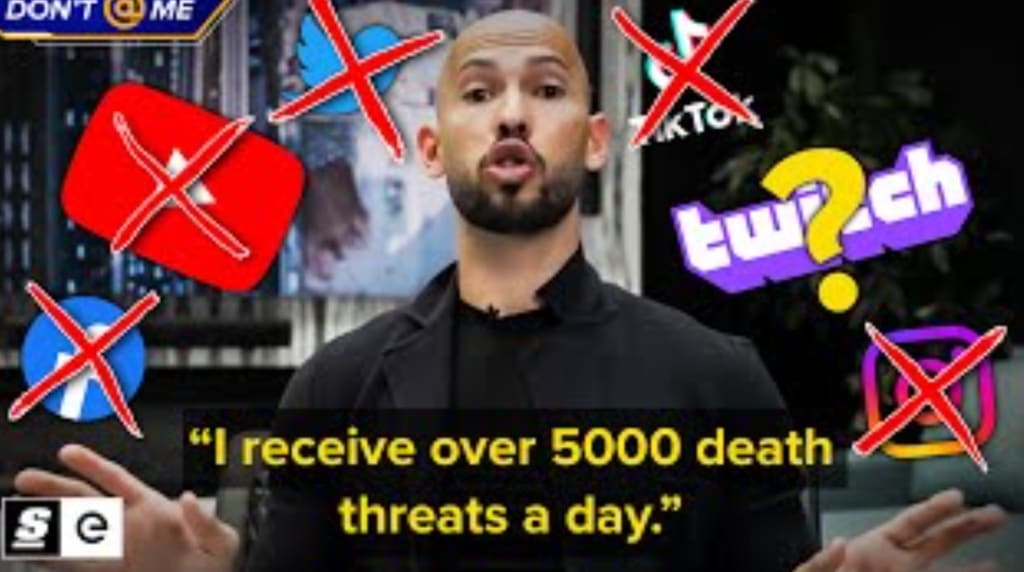
Introduction
Welcome, dear readers, to this discussion about the Andrew Tate Ban and the Power Dynamics of Social Media. As we explore this topic, we must acknowledge the importance of understanding the complexities of social media and its impact on society. Like many aspects of our rapidly advancing world, social media is a powerful tool that has the potential to bring people together or tear them apart. We must be cognizant of its power and the implications of its actions. In this article, we will delve into the details of the Andrew Tate Ban and how it speaks to the larger issue of power dynamics in social media. So let us buckle up and prepare to journey into the digital landscape, exploring the frontiers of social media and its potential impact on our society.
Overview of the Andrew Tate Ban
For those unfamiliar with the Andrew Tate Ban, allow me to provide a brief summary. Andrew Tate is a former kickboxing champion turned entrepreneur and social media personality. He gained a large following on various social media platforms, particularly on Instagram and Twitter, where he often posted controversial and provocative content. However, in late 2020, Andrew Tate found himself banned from several social media platforms, including Instagram, Twitter, and YouTube. The reasons for the ban were unclear and shrouded in controversy, with many speculating that it was due to his views and content. Regardless of the reasons, the ban had a significant impact on Andrew Tate’s online presence and career, raising questions about the power and influence of social media platforms. In the following sections, we will explore the broader implications of the Andrew Tate Ban and its relationship to the power dynamics of social media.
The Power Dynamics of Social Media
The power dynamics of social media are complex and multifaceted, and they play a significant role in shaping our digital landscape. Social media platforms wield immense power over the content that is shared on their platforms and the users who create and consume that content. They have the ability to regulate and moderate content, determine what is acceptable or not, and ultimately decide who has a voice and who does not.
This power has significant implications for individuals and communities alike. Social media bans, for example, can have a profound impact on people’s lives, particularly those who rely on social media for their livelihoods. The consequences of these bans can extend far beyond the digital realm, affecting an individual’s reputation, career, and even mental health.
Moreover, there is a growing concern over the potential for abuse of power by social media platforms. As the gatekeepers of online discourse, these platforms have the ability to shape public opinion and influence political discourse. This has led to calls for greater transparency and accountability from social media platforms, particularly in how they handle user content and moderate discourse.
In short, the power dynamics of social media are significant and have the potential to shape our digital landscape in profound ways. It is important that we continue to engage in critical conversations about these dynamics to ensure that the power is wielded responsibly and in the best interests of society.
The Andrew Tate Ban in the Context of Power Dynamics
The Andrew Tate Ban is a prime example of the power dynamics at play in social media. Andrew Tate was a controversial figure who often shared provocative content on his social media platforms, which gained him a large following. However, the reasons for his ban from social media platforms, particularly Instagram, Twitter, and YouTube, remain unclear, leading to speculation that it was due to his views and content.
Regardless of the reasons for the ban, it highlights the significant power wielded by social media platforms over the content and discourse that occurs on their platforms. It raises questions about the role of social media platforms in controlling content and speech and the impact this has on individual freedom of expression.
Furthermore, the Andrew Tate Ban also has broader implications for free speech and dissent in the digital age. As social media platforms continue to grow in importance as a tool for public discourse, it is essential that we ensure that the right to free expression is protected and that the power dynamics of social media do not stifle debate and dissent.
In short, the Andrew Tate Ban provides us with a unique opportunity to examine the power dynamics of social media and the impact it can have on individuals, communities, and society as a whole. As we move forward, it is essential that we continue to engage in critical conversations about these dynamics to ensure that social media platforms are held accountable and that individual freedom of expression is protected.
Critiques of Social Media Power Dynamics
Critiques of social media power dynamics have been mounting in recent years, as concerns over the impact of these platforms on society continue to grow. One of the most significant critiques is that social media platforms have too much power over the content that is shared on their platforms and the individuals who create and consume that content.
Critics argue that this power can be abused, leading to censorship, the stifling of dissent, and the silencing of marginalized voices. They argue that social media platforms must be held accountable for the content that appears on their platforms and that there must be greater transparency in how content is moderated.
Another critique of social media power dynamics is that they can have a negative impact on mental health. Social media platforms are designed to be addictive, with features such as notifications, likes, and comments that keep users engaged for longer periods. This can lead to negative impacts on mental health, such as addiction, anxiety, and depression.
Finally, there is growing concern over the impact of social media on democracy and political discourse. Social media platforms have the power to shape public opinion and influence political discourse, leading to concerns over the potential for manipulation and propaganda.
In conclusion, critiques of social media power dynamics are significant and must be taken seriously. As we move forward, it is essential that we continue to engage in critical conversations about the impact of social media on society and that we work to ensure that these platforms are held accountable for their actions. By doing so, we can ensure that social media is used for the betterment of society, rather than its detriment.
Conclusion
In conclusion, the Andrew Tate Ban serves as a reminder of the significant power dynamics at play in social media. As social media platforms continue to grow in importance as a tool for public discourse, it is essential that we examine these power dynamics and ensure that the right to free expression is protected.
Moreover, we must also be aware of the potential for abuse of power by social media platforms and the impact this can have on individuals and society as a whole. This requires greater transparency and accountability from social media platforms, as well as critical engagement from users and society at large.
In short, we must continue to engage in critical conversations about the power dynamics of social media to ensure that these platforms are held accountable and used for the betterment of society. By doing so, we can build a more equitable, democratic, and free digital landscape for all.
About the Creator
Samuel
I write about Science/Tech/Business & Anything that can give value to people ❤️
I'm on YouTube too guys feel free to check out my channel here: www.youtube.com/@sambladeco






Comments
There are no comments for this story
Be the first to respond and start the conversation.